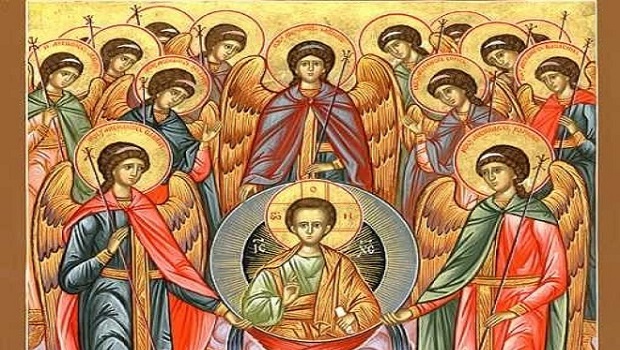O come, let us sing to the Lord let us make a joyful noise to the rock of our salvation! Let us come into His presence with thanksgiving; let us make a joyful noise to Him with sons of praise! Psalm 95:1-2
One very practical challenge to faith, for all of us, including me (a priest) is connecting with God in worship. Here are some of them, along with some thoughts on how to overcome them:
Worship is repetitive —This might be the number one challenge/complaint I hear about Orthodox worship. The Divine Liturgy is virtually the same every time we do it. So, if we miss this Sunday, it’s not like missing an episode of our favorite series and losing our place in the story. We can miss a Sunday, or three, and come back and it’s the same thing. The counter for this is that the Divine Liturgy is a complete journey through history, life and salvation, which includes things we should be thinking about and praying for at least once a week, if not more often. While I pray every day (well, I confess, most days), I do not pray about the forgiveness of my sins every day, or meditate on my defense at the awesome judgment seat of Christ, or remember to pray for our President, and so many other things that are included in the Divine Liturgy. The Liturgy, among other things, encompasses everything we should be praying about and thinking about. The Divine Liturgy provides the unique opportunity to have a physical encounter with Jesus Christ in the Eucharist. We can’t have this anywhere outside of the Liturgy. The Liturgy describes Holy Communion as a provision for eternal life. Think about taking a journey and packing provisions for the trip—food, water, a map, etc. In our trip through life, on our journey to eternal life, one of the most important provisions is the Eucharist. If eternal life will expose us eternally to the glory and majesty of God, we need to learn on our way by receiving His majesty and glory in small doses. Finally, for me anyway, the Divine Liturgy serves as a marker which affects the rest of my life. On the rare occasion I do not attend Liturgy on a Sunday, I feel like something is out of balance. My whole life, the Divine Liturgy has been the beginning of every week. And while I don’t carry it’s majesty and glory all week, it is something I think about throughout the week, i.e. I need to watch my behavior on Saturdays as I am about to receive Christ, and on Sundays, when I have just received Him. I find that the more often I worship, the more focused I am on my practice of Christianity, specifically because there is a “date” with Jesus Christ that I want to be perpetually ready for.
Not interactive—The next biggest complaint/challenge, after “Liturgy is repetitive,” is that “Liturgy is boring.” And it’s boring because it is not interactive. I celebrate the Divine Liturgy over one hundred times each year, and while some of them, especially when we celebrate several times in a week might be boring, that is definitely the exception and not the rule. I have a different experience than most of you because the Divine Liturgy is very interactive for me, I’m doing something, so it is not boring. On the rare occasion when I am not serving, but am sitting in the pews, I can understand how it could be boring because of the lack of interaction. This is solved by singing the responses, which is the intention in worship. Worship is not supposed to be a show between the priest and choir/chanter, but a leading of the people in worship. All the people should offer the responses to the petitions. And each petition should evoke some thought, probably a different thought for each person, and perhaps a different thought for each of us each time we hear a petition. There are dozens of thoughts that can be evoked by each petition, and part how to make Liturgy both interactive and not-repetitive, is to allow our minds to have different thoughts each time we attend the Divine Liturgy. For instance, on the petition “For our country, the President and all those in civil authority and public service,” I could think of the President, police officers, firefighters, city administrators, military servicepeople, their families, etc., so many possibilities just on one petition.
Language —This is an opinion, not the wish to start a debate. I did not grow up speaking Greek, I speak Greek now and I can celebrate the Divine Liturgy entirely in Greek if needed and do it well. However, the overwhelming majority of Orthodox Christians in America do not understand Greek, or Russian, or Arabic or any of the other languages used in worship. There is actually no one in my parish at present who does not understand English (that wasn’t the case ten years ago, or when I was growing up). So when we pray in a language people do not understand, it is hard to be interactive. In my parish, we do a little bit of Greek, both for history (this is where we come from and the language the Liturgy was written in) and nostalgia, but 90+ percent of the Divine Liturgy is now in English, and I believe that is the number reason that the church where I serve has doubled in size in the past twenty years. Let’s say, however, that the church you attend does a lot of the service in Greek (or another language), or that the choir or chanter is not great, the aesthetics aren’t there, we might have to make more effort but we will still get something out of worship, because just being in the presence of God does something, being present when the grace of the Holy Spirit comes down at the consecration does something even if the words are said in another language. I wrote several months ago about the example of someone going to a perfume store and not buying anything would still come out smelling good. And it’s the same thing with worship. Even if we don’t understand the language, or the meaning, just being there does something positive for us.
We don’t understand what we are doing—Many of us haven’t invested the time to study the Divine Liturgy, meaning, to read a book about it, ask a question about it, speak to a priest about it, or take a catechism class about it. The Divine Liturgy is so important, and yet, many of us haven’t taken the time to learn much about it. Knowledge is power, I often write, and thus the Liturgy could have more power in our lives if we had more knowledge of it. (I have written a book entitled “Blessed is the Kingdom: Reflections on the Divine Liturgy of St. John Chrysostom,” Ancient Faith Publishing, 2024, specifically to give a basic understanding about how to get more out of worshipping at the Divine Liturgy.)
Time—Of course, people complain that they don’t have time to worship, or that the Liturgy lasts too long. We make time for what is important in life. We make time to watch three hour sports games, we binge watch hours of our favorite series, we get to our children’s sports games early, and we don’t complain about any of these things. How we spend our time reflects what is important. We make time for the important things. It’s up to each of us to decide how important worship is when dividing up our time.
The rest of our life doesn’t prepare us for worship—In the last reflection, we discussed how our lives should revolve around God, and not the other way around. It’s the same with worship. Our lives should revolve around the celebration of the Divine Liturgy—that should be the crown jewel each week as far as activities. One challenge is that we are involved in many activities that are incongruent with worship, such as swearing at the TV while drinking too much on Saturdays as we watch college football. Nothing wrong with football or drinking but when one has taken these things to extremes on a Saturday, it is hard to feel like being quiet on a Sunday, or even worthy to enter the church, knowing what we just spent our Saturday doing. Some people stay away from worship because they know how they are living is wrong, but attractive so they still keep doing it and decide to pick up worship “later.” Living a life that is congruent with Christianity, makes worship something that we can look forward to, feeling a sense of belonging in it, and also something we can use as a booster, to help us live the life that matches what we claim to believe.
Lord, thank You for the gift of worship, the opportunity to connect with You in the Eucharist, and the Spirit-inspired service written so many years ago which takes us on a tour of everything important in this life, preparing us for eternal life. Help me to better comprehend what we are doing in worship, what it means, and what it can mean for me. Help me to be focused and engaged, and to think on and internalize the petitions that are being offered so that I can participate in the responses, offering my prayers for the many things that are offered in the petitions. Continue to kindle in my heart and soul, a desire to connect with You in worship, and thank You for offering Yourself to me, unworthy as I am, in the Holy Eucharist. Amen.
If we aren’t connecting in worship, it is probably due to one or more of these six things. Fixing some of them, at least the ones we can control, will help us get more out of worship and look forward to worshipping.



0 Comments